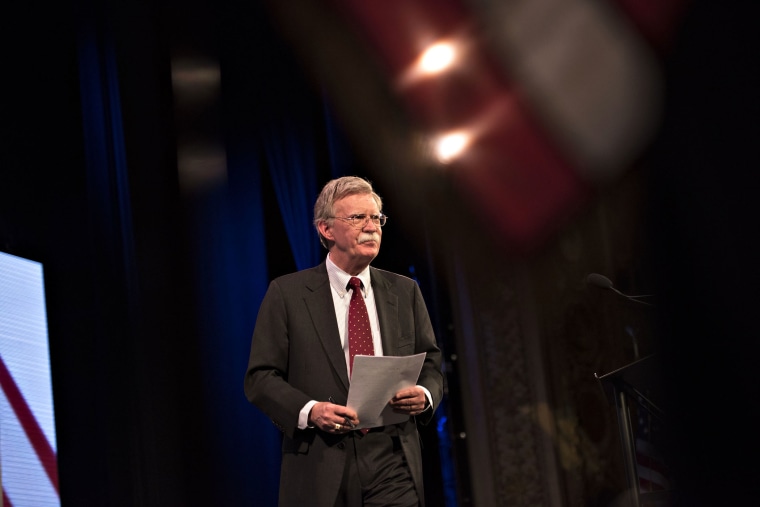Former United Nations Ambassador John Bolton announced on Thursday he would not run for president, ending his months-long flirtation with a White House bid centered on national security.
“Looking forward, I have decided not to seek the Republican nomination for president,” Bolton said in a video posted to supporters on Facebook, an advance copy of which was provided to msnbc. ”I believe I can make the strongest contribution to our future by continuing as a clear and consistent advocate for a strong Reaganite foreign policy that values peace through strength.”
Bolton, who was recess-appointed to his ambassadorship by President George W. Bush after failing to win confirmation in the Senate in 2005, discussed the move with reporters shortly after the video went live.
According to Bolton, he will play an active outside role in the race through John Bolton PAC and super PAC, which will focus on foreign policy, track the presidential campaign and could run ads in Senate races. He said he has also been in conversation with some of the 2016 presidential candidates and would offer his advice throughout the campaign.
"The people who want to be the nominee of the party have to demonstrate that they feel in their gut that protecting the country is the president's first job," he said.
Bolton added that Republicans were "much at fault" for not devoting enough time toward criticizing President Obama's foreign policy, but Bolton sounded confident that recent events, such as the rise of the Islamic State and the Charlie Hebdo masacre in Paris, would ensure a significant national security debate in 2016.
RELATED: Rand Paul fights off GOP hawks at New Hampshire 2016 summit
Known for his hawkish views, Bolton positioned himself explicitly as an antagonist to 2016 contender Sen. Rand Paul (R-Ky.), a Bush critic skeptical of military action abroad, and planned to challenge his foreign policy philosophy in presidential debates.
“Republicans are small government conservatives and so an ideological libertarian [like Paul] says a lot of things they agree with,” Bolton told msnbc in February. “The consequences if you don’t require the candidates to elaborate on their national security views [is that] somebody with a view that doesn’t reflect the vast majority of the party might slip by.”
While candidates in the field tend closer to Bolton when it comes to national security, his role may fall most directly to Sen. Lindsey Graham (R-S.C.), a prominent hawk a run who has clashed with Paul repeatedly on foreign policy over the last several years.
